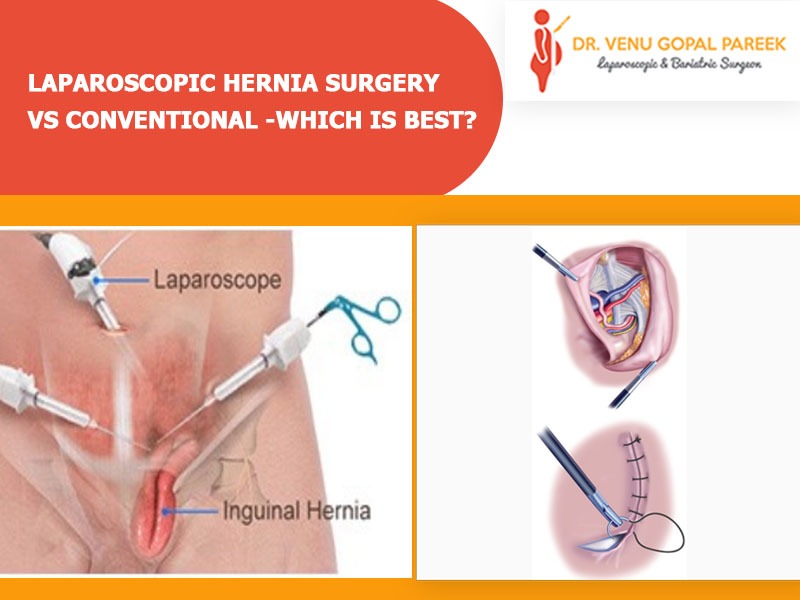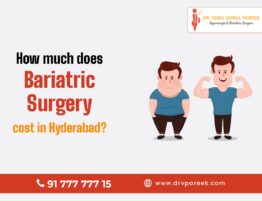
A hernia occurs when adipose tissue or an organ pushes a weak spot into the surrounding connective tissue or muscle wall. Hernias usually don’t heal on their own. They tend to get bigger. In rare cases, they can lead to life-threatening complications. This is why doctors often recommend surgery. However, not every hernia needs to be treated immediately. It depends on the size and symptoms. Surgical repair of a hernia involves pushing the protrusion back into the part of the body that should accommodate it and holding it there.
But,
Most of us have a question about hernia surgery, and what are the types? Do they need Laparoscopic or conventional surgery?
This article by Dr Venu Gopal Pareek will help you decide between Laparoscopic Hernia Surgery and Conventional surgery.
Why Does the doctor recommend hernia surgery?

Your doctor will likely recommend it if one of the following occurs:
- The tissue (such as the intestines) becomes trapped in the stomach wall. This is called incarceration. If left untreated, suffocation can occur. Then the blood supply to the tissues is cut off.
- If the hernia is strangulated, this can lead to permanent damage and needs urgent surgery. The strangulated organ, usually the intestine, dies. If it is not removed immediately, you can become very sick. Call a doctor right away if you have fever or nausea, sudden pain that gets worse, or a hernia that turns red, purple, or dark.
- If hernia causes pain, discomfort, or growth.
What types of hernia surgeries do doctors recommend?

The two main types of hernias are traditional open surgery and laparoscopic surgery. There is no one right approach for every patient. Patients with some types of hernia may benefit from open hernia surgery, while other similar patients may require laparoscopic hernia repair. The size of the hernia, its location, and whether it is unilateral or bilateral will influence the best approach. Your doctor decides it. To compare open and laparoscopic hernia surgery, patients can read this article.
Currently, most of the hernia repair surgeries are performed with the help of laparoscopic surgery. The main reason for this is:
- Shorter recovery time. Patients can usually recover in about a week compared to open surgery
- There is usually no need to stay in the hospital after the procedure
- The scar is much smaller compared to open surgery (1-2 cm incision compared to 4-5 cm incision)
- Overall less pain after the procedure (~ 66% of patients with very little / no pain, see open surgery at ~ 33% 1)
However, the laparoscopic approach has several drawbacks compared to conventional open surgery. They relate specifically to two factors:
- The surgeon uses remote instruments and does not use his hands to manipulate tissue,
- The imaging from video cameras does not provide the same depth of view as direct vision. This can increase the risk of accidents.
In general, the following types of surgery are used for different types of hernias, unless other factors play.
- Femoral hernia: Open.
- Inguinal hernia: Laparoscopic or open.
- Parastomal hernia: Laparoscopy.
- Umbilical hernia: Open.
- Ventral / incisional hernia: Laparoscopy.
Comparison between open and laparoscopic Hernia Surgery:

| Open Hernia Surgery | Laparoscopic Hernia Surgery |
| The most commonly used technique for hernia repair. Techniques vary widely from surgeon to surgeon. | A nowadays patient preferred approach to hernia repair. Requires training. |
| This can be done under local anaesthesia under sedation. | Requires full general anaesthesia. |
| The hernia is repaired on the outside by opening the muscle above the weakness. | The hernia repaired from inside behind the muscles that are the weakness. |
| Requires standard surgical equipment. | Requires advanced laparoscopic equipment. |
| The recurrence rate is 1-2%, and the infection rate is <1%. | The recurrence rate is 1-2%, and the infection rate is <1%. |
| 4-5 cm incision in the groin or in the bikini area. | 1-2 cm incision in the navel and two small holes below the navel. |
| The mesh is behind the muscles and above the muscles. The nets are sutured into place. | The mesh is placed just behind the muscle and sutured with absorbable sutures. |
| Basic care before surgery is required. | Sometimes further treatment is needed because general anaesthesia is used. |
| All patients returned to normal activities within 1-3 weeks. | All patients returned to normal activities within 1-2 weeks. |
| The most affordable option for patients. | Costs little high for patients due to the need for additional laparoscopic equipment. |
| Even the largest and most complex hernias can be repaired. | Some large, chronic, and long hernias can be difficult to repair. |
| On average, 1/3 of patients experience little or no pain after surgery. 2/3 of people experience moderate pain after surgery. | On average, 2/3 patients experience little or no pain after surgery. 1/3 have moderate pain after surgery. |
| The operation usually takes about 30-45 minutes. | The operation takes about 45-60 minutes. |
Which approach is better, open or laparoscopic?

Again, the answer to this question depends on what endpoints the patient has for success. It depends on the size of the hernia and the doctor’s opinion on the patient’s health. The answer is different if the patient is interested in cost, pain relief, recovery, or anaesthesia. It is important to note that a long-term recurrence rate of 5 to 10 years is not yet available for laparoscopic hernia repair.
It’s also important to note that some doctors only recommend the open approach because of the higher costs associated with laparoscopic repair. Others recommend an open approach for unilateral hernias and a laparoscopic approach for bilateral hernias. Finally, in many cases, other surgeons recommend a laparoscopic approach and maintain an open approach for patients who are at higher risk of general anaesthesia. They believe that there are less pain and a return to activities sooner than the difference in cost.
Conclusion:
If the hernia is massive or has been present for a long time, an open procedure via the laparoscopic option may be recommended. Sometimes, when deemed necessary, the surgeon has to convert the laparoscopic procedure to an open procedure, to minimize the chance of tissue damage or bleeding. This is a reasonably straightforward process, and these decisions are often made due to inadequate visualization of organs by a laparoscopic camera.
For more information on hernia, surgeries, contact Dr Venu Gopal Pareek at 091777 77715 and book your appointment.







